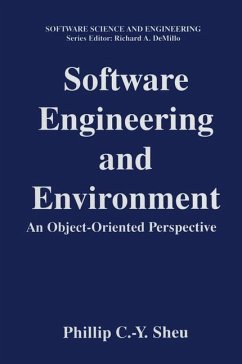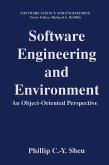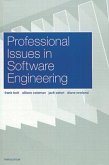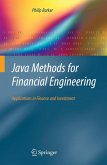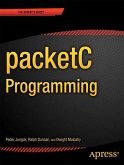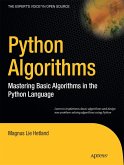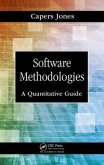- Broschiertes Buch
- Merkliste
- Auf die Merkliste
- Bewerten Bewerten
- Teilen
- Produkt teilen
- Produkterinnerung
- Produkterinnerung
Software Engineering and Environment examines the various aspects of software development, describing a number of software life cycle models. Twelve in-depth chapters discuss the different phases of a software life cycle, with an emphasis on the object-oriented paradigm. In addition to technical models, algorithms, and programming styles, the author also covers several managerial issues key to software project management. Featuring an abundance of helpful illustrations, this cogent work is an excellent resource for project managers, programmers, and other computer scientists involved in software production.…mehr
Andere Kunden interessierten sich auch für
![Software Engineering and Environment Software Engineering and Environment]() Phillip C.-Y. SheuSoftware Engineering and Environment60,99 €
Phillip C.-Y. SheuSoftware Engineering and Environment60,99 €![Professional Issues in Software Engineering Professional Issues in Software Engineering]() Frank BottProfessional Issues in Software Engineering110,99 €
Frank BottProfessional Issues in Software Engineering110,99 €![Java Methods for Financial Engineering Java Methods for Financial Engineering]() Philip BarkerJava Methods for Financial Engineering70,99 €
Philip BarkerJava Methods for Financial Engineering70,99 €![Studies in Computer Science Studies in Computer Science]() Studies in Computer Science38,99 €
Studies in Computer Science38,99 €![Packetc Programming Packetc Programming]() Peder JungckPacketc Programming41,99 €
Peder JungckPacketc Programming41,99 €![Python Algorithms Python Algorithms]() Magnus Lie HetlandPython Algorithms56,99 €
Magnus Lie HetlandPython Algorithms56,99 €![Software Methodologies Software Methodologies]() Capers JonesSoftware Methodologies153,99 €
Capers JonesSoftware Methodologies153,99 €-
-
-
Software Engineering and Environment examines the various aspects of software development, describing a number of software life cycle models. Twelve in-depth chapters discuss the different phases of a software life cycle, with an emphasis on the object-oriented paradigm. In addition to technical models, algorithms, and programming styles, the author also covers several managerial issues key to software project management. Featuring an abundance of helpful illustrations, this cogent work is an excellent resource for project managers, programmers, and other computer scientists involved in software production.
Produktdetails
- Produktdetails
- Software Science and Engineering
- Verlag: Springer / Springer US / Springer, Berlin
- Artikelnr. des Verlages: 978-1-4613-7710-8
- Softcover reprint of the original 1st ed. 1997
- Seitenzahl: 340
- Erscheinungstermin: 5. November 2012
- Englisch
- Abmessung: 229mm x 152mm x 19mm
- Gewicht: 494g
- ISBN-13: 9781461377108
- ISBN-10: 1461377102
- Artikelnr.: 37478963
- Herstellerkennzeichnung Die Herstellerinformationen sind derzeit nicht verfügbar.
- Software Science and Engineering
- Verlag: Springer / Springer US / Springer, Berlin
- Artikelnr. des Verlages: 978-1-4613-7710-8
- Softcover reprint of the original 1st ed. 1997
- Seitenzahl: 340
- Erscheinungstermin: 5. November 2012
- Englisch
- Abmessung: 229mm x 152mm x 19mm
- Gewicht: 494g
- ISBN-13: 9781461377108
- ISBN-10: 1461377102
- Artikelnr.: 37478963
- Herstellerkennzeichnung Die Herstellerinformationen sind derzeit nicht verfügbar.
1. Software Life Cycle Models.- Problems.- References.- 2. Object-Oriented Concepts and Modeling.- 2.1. Basic Concepts of the Object-Oriented Paradigm.- 2.2. Object Modeling.- 2.3. Advanced Object Models.- Problems.- References.- 3. Formal Specification and Verification.- 3.1. First-Order Logic.- 3.2. Logic and Database.- 3.3. Formal Specification in Z.- 3.4. Object-Oriented Logic System.- 3.5. Algebraic Specifications.- 3.6. Petri Nets.- 3.7. Verifying Specifications.- 3.8. Final Remarks.- Problems.- References.- 4. Design Methodologies and Specifications.- 4.1. Design Concepts.- 4.2. Process Description Languages and Design Methodologies.- 4.3. Dynamic and Functional Modeling.- 4.4. Object-Oriented Design Methodologies.- 4.5. Design Verification and CASE Tools.- Problems.- References.- 5. Programming and Coding.- 5.1. Object-Oriented Programming Languages.- 5.2. c++.- 5.3. SMALLTALK.- 5.4. Distributed Programming Languages.- 5.5. Communicating Sequential Processes and OCCAM.- Problems.- References.- 6. Programming Tools.- 6.1. Object-Oriented Programming for Windows.- 6.2. IDE-An Interactive Programming Environment.- 6.3. X-Window Programming.- 6.4. UNIX Network Programming.- Problems.- References.- 7. Declarative Programming.- 7.1. Very High Level Programming.- 7.2. Object-Oriented Declarative Programming.- 7.3. Logic Programming-PROLOG.- 7.4. COMPOSE-An Object-Oriented Programming Environment.- Problems.- References.- 8. Automatic Program Synthesis and Reuse.- 8.1. Deductive Program Synthesis.- 8.2. Transformational Program Synthesis.- 8.3. Program Abstraction and Instantiation.- 8.4. Automatic Software Reuse.- Problems.- References.- 9. Program Verification and Testing.- 9.1. Formal Program Verification.- 9.2. Black Box Testing.- 9.3. Structural Testing.-9.4. Error-Based Testing.- 9.5. Automatic Test Case Generation.- 9.6. Testing and Debugging Distributed Programs.- 9.7. Analysis Tools and Software Metrics.- Problems.- References.- 10. Software Maintenance.- 10.1. Components of Software Maintenance.- 10.2. Database and Software Maintenance.- 10.3. Programming Object Bases.- 10.4. Program Management.- 10.5. Reverse Engineering and Design Recovery.- Problems.- References.- 11. Advanced Programming Environments.- 11.1. Knowledge-Based Programming Environments.- 11.2. Visual Programming Environments.- 11.3. Distributed Object-Oriented Programming Systems.- 11.4. Component Software.- 11.5. Programming Environments for Concurrent Engineering.- References.- 12. Other Selected Topics.- 12.1. Project Management.- 12.2. Fault-Tolerant System Design.- 12.3. Discrete Event Simulation.- 12.4. Internet Programming.- References.
1. Software Life Cycle Models.- Problems.- References.- 2. Object-Oriented Concepts and Modeling.- 2.1. Basic Concepts of the Object-Oriented Paradigm.- 2.2. Object Modeling.- 2.3. Advanced Object Models.- Problems.- References.- 3. Formal Specification and Verification.- 3.1. First-Order Logic.- 3.2. Logic and Database.- 3.3. Formal Specification in Z.- 3.4. Object-Oriented Logic System.- 3.5. Algebraic Specifications.- 3.6. Petri Nets.- 3.7. Verifying Specifications.- 3.8. Final Remarks.- Problems.- References.- 4. Design Methodologies and Specifications.- 4.1. Design Concepts.- 4.2. Process Description Languages and Design Methodologies.- 4.3. Dynamic and Functional Modeling.- 4.4. Object-Oriented Design Methodologies.- 4.5. Design Verification and CASE Tools.- Problems.- References.- 5. Programming and Coding.- 5.1. Object-Oriented Programming Languages.- 5.2. c++.- 5.3. SMALLTALK.- 5.4. Distributed Programming Languages.- 5.5. Communicating Sequential Processes and OCCAM.- Problems.- References.- 6. Programming Tools.- 6.1. Object-Oriented Programming for Windows.- 6.2. IDE-An Interactive Programming Environment.- 6.3. X-Window Programming.- 6.4. UNIX Network Programming.- Problems.- References.- 7. Declarative Programming.- 7.1. Very High Level Programming.- 7.2. Object-Oriented Declarative Programming.- 7.3. Logic Programming-PROLOG.- 7.4. COMPOSE-An Object-Oriented Programming Environment.- Problems.- References.- 8. Automatic Program Synthesis and Reuse.- 8.1. Deductive Program Synthesis.- 8.2. Transformational Program Synthesis.- 8.3. Program Abstraction and Instantiation.- 8.4. Automatic Software Reuse.- Problems.- References.- 9. Program Verification and Testing.- 9.1. Formal Program Verification.- 9.2. Black Box Testing.- 9.3. Structural Testing.-9.4. Error-Based Testing.- 9.5. Automatic Test Case Generation.- 9.6. Testing and Debugging Distributed Programs.- 9.7. Analysis Tools and Software Metrics.- Problems.- References.- 10. Software Maintenance.- 10.1. Components of Software Maintenance.- 10.2. Database and Software Maintenance.- 10.3. Programming Object Bases.- 10.4. Program Management.- 10.5. Reverse Engineering and Design Recovery.- Problems.- References.- 11. Advanced Programming Environments.- 11.1. Knowledge-Based Programming Environments.- 11.2. Visual Programming Environments.- 11.3. Distributed Object-Oriented Programming Systems.- 11.4. Component Software.- 11.5. Programming Environments for Concurrent Engineering.- References.- 12. Other Selected Topics.- 12.1. Project Management.- 12.2. Fault-Tolerant System Design.- 12.3. Discrete Event Simulation.- 12.4. Internet Programming.- References.

